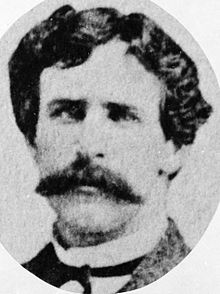
Back فرانكلين جيه. موسيس (محامى) ARZ فرانکلین جی. موزز.جی. AZB Franklin Moses German Franklin Moses Dutch Franklin Moses Swedish
This article includes a list of general references, but it lacks sufficient corresponding inline citations. (October 2014) |
Franklin Moses | |
|---|---|
 | |
| 75th Governor of South Carolina | |
| In office December 7, 1872 – December 1, 1874 | |
| Lieutenant | Richard Howell Gleaves |
| Preceded by | Robert Kingston Scott |
| Succeeded by | Daniel Henry Chamberlain |
| 27th Speaker of the South Carolina House of Representatives | |
| In office November 24, 1868 – November 26, 1872 | |
| Governor | Robert Kingston Scott |
| Preceded by | Charles Henry Simonton |
| Succeeded by | Samuel Lee |
| Adjutant-General of South Carolina | |
| In office July 6, 1868 – December 7, 1872 | |
| Governor | Robert Kingston Scott |
| Preceded by | Albert Garlington |
| Succeeded by | Henry Purvis |
| Personal details | |
| Born | January 1, 1838 Sumter District, South Carolina, U.S. |
| Died | (aged 67–68) Winthrop, Massachusetts, U.S. |
| Political party | Republican |
| Spouse | Emma Buford Richardson (1869–1878) |
| Children | 4 |
| Education | University of South Carolina |
Franklin Israel Moses Jr. (January 1, 1838 – December 11, 1906) was a South Carolina lawyer and editor who became active as a Republican politician in the state during the Reconstruction Era. He was elected to the legislature in 1868 and as governor in 1872, serving into 1874. Enemies labelled him the 'Robber Governor'.
A secessionist before the war, Moses was ready to make alliances afterward. He served in the state legislature from 1868 to 1872, where he was elected as speaker of the House.[1] He supported integration of the state university, establishing new social programs and public funding of old-age pensions, and created a black militia to help protect freedmen from white paramilitary insurgents. He was also unusual for hosting African Americans socially, both as a governor and as a private citizen.[2]
When Moses was young, his middle initial was confused for the letter J, and thereafter he became known simply as Franklin J. Moses Jr.; his father also adopted use of the "J."[3] His father, Franklin J. Moses Sr., was an attorney who served as a South Carolina state senator for more than 20 years; in 1866 he was elected as judge to the circuit court, and in 1868 as Chief Justice of the State Supreme Court.
- ^ "South Carolina During the Late 1800s - the 48th General Assembly (1868-1870)".
- ^ Ginsberg, 2010, p. 2.
- ^ Gregorie, p. 94-95, 326–637.